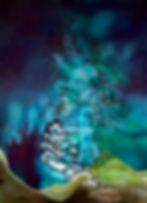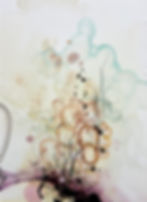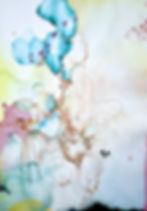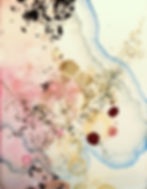SELECTED WORK
tap artwork for full image and details
Migrations
November 21 - December 22, 2024
at the Jung Center, Houston, Texas
Migrations, the title of Grayson Chandler’s upcoming solo, speaks to the operative manner of abstraction he uses to navigate his paintings. Circumscribed in his artwork is an invitation to explore and observe the ways through which intuition and personal experience shape our vision. Moreover, as our senses advance, and the scope of our perception expands, so does the relationship between ourselves and our outlook. According to Chandler, what unfolds in the space between observer and observed is an instinct wherein meaning emerges — and out of which, mindful cooperation with one’s inner landscape is given ground to roam.




















PLANTING TRACES
Planting Traces alludes to the manner of abstraction that permeates Chandler's artwork. Embedded in his process is the idea of allowing subliminal matters the space and time to grow into something more observable, so that something more illuminating may take root. This preoccupation with observation stems from a belief that meaning emerges out of mindful cooperation with one’s surroundings, and that as one becomes more mindful of their environment, a sense of destination is nurtured.
Planting Traces suggests a connotation of passage and growth, imbibing the artwork with an undercurrent of cause and effect. Yet, despite these cyclical overtones, Chandler’s work remains uninhabited by chronological order. Instead, his work echoes outside of history, arousing a place that seems suspended in its own time. What ultimately germinates between Chandler’s artwork and those it attracts, is a place where viewers are given room to grow mindful regarding the nature of their own perception.












PROSERPINA
Proserpina, the Roman counterpart to the Greek goddess of Spring, is an allusion to Chandler’s spring solo, highlighting the significance of the otherworldly undertones that animate his work. With this in mind, Proserpina encourages an outlook which draws parallels between the forces, functions, and motivations calling for mythology, and the capacity we share to encode, explain, and distill real-world experience from a place of fiction.




















IN VIA
Via, borrowing from the Latin ablative for road, is an english preposition meaning “by way of; through.” The guiding ethos of IN VIA is one which echos a compulsion for motion. Complimented by its phonetic proximity to words such as viva, vida, and vive, IN VIA encourages connotations of living, passing, and connecting. Within this vein, Chandler’s latest exhibit serves to circumscribe the ways through which he channels his creative spirit into otherworldly artworks. As a special feature, Chandler invites viewers to get a closer glimpse into his artistic practice. By assembling his studio as a fixture of the exhibit, IN VIA aims to reproduce a more comprehensive showcase for the manifold of means, methods, and measurements by which Chandler finds vitality in his vision.




















APOPHENIA
Pearl Fincher Museum of Fine Art
September 10 - October 16, 2021
























TELOS: AFTER THOUGHT
Telos: After Thought materializes a burgeoning philosophy taking root in Grayson’s studio practice. Telos, from the Greek τέλος, translates to “end”, “object”, “purpose”, signifying finality to be the ultimate pursuit of any action. While purpose is concerned with acquisition — a solution for measuring up to preeminent judgement — the alternative is a suspension of judgement in the interest of furthering observation. Ontologically speaking, these sensibilities are diametrically opposed, but where these temperaments collide is a space that invites opportunity to explore. Possibility prevails where purpose is not a means to an end.


















COCOON
In his latest solo installment, Grayson explores concepts of metamorphosis, emergence, and notions of self, in relation to the human psyche. Drawing from aspects of these concepts, this body of work attempts to transcend a sense of duality — the perception of self and other as separate — instead instilling in viewers a state of awareness that begins and ends with the self.
Just as an arthropod’s chrysalis involves a state of being in which both caterpillar and butterfly exist in utero, Cocoon suggests the same comparison in terms of the human experience. Although both caterpillar and butterfly are implied in the process, the cocoon exists as neither, but rather as a medium through which change is experienced. In the same vein, notions of self and other are both conceived in the mind before either can be perceived as reality. As our perceptions become realized, so do the means by which we experience subsequent notions of ourselves and others; and ourselves in others. In this manner, the mind — like a cocoon — is a medium through which we shape ourselves, and experience the world around us.










TAUTOLOGIES & MEMOIRS












